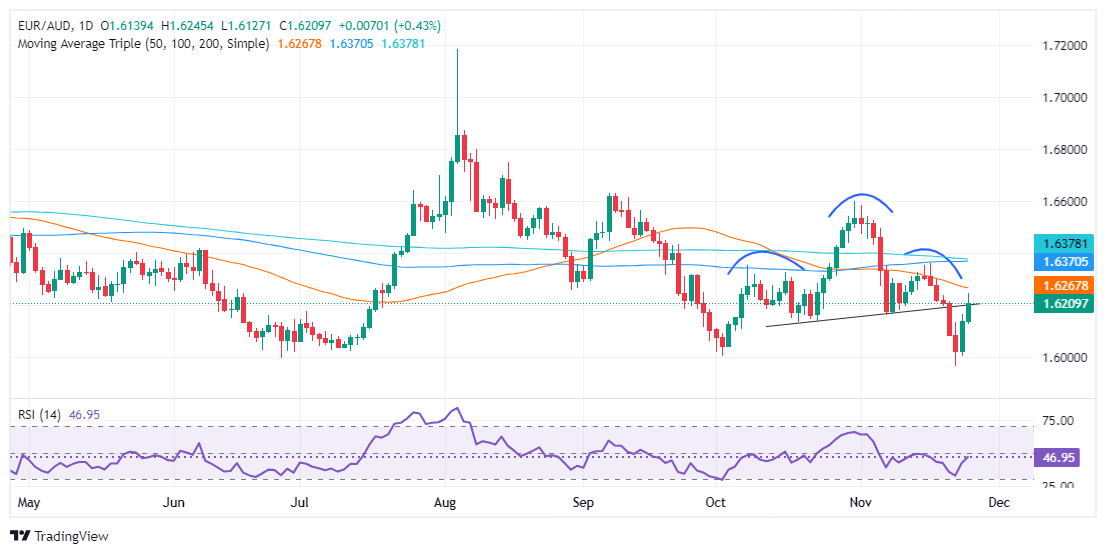- EUR/AUD is trading at 1.6209, marking a second consecutive day of gains, with a daily high of 1.6244.
- Resistance Levels: 50-day SMA at 1.6261, followed by 1.6300, and 100-day SMA at 1.6365.
- Support levels: 1.6200, 1.6161 (Nov. 7 low), and the key psychological level at 1.6100.
EUR/AUD advanced for the second day in a row as Trump’s threats to impose tariffs on China were a headwind for the Australian dollar. Therefore, the cross pair rose more than 0.50% and was trading at 1.6209 at the time of writing.
EUR/AUD Price Forecast: Technical Outlook
The EUR/AUD bearish trend remains intact, with the pair recording a successive series of lower highs and lower lows. Even though the pair hit a daily high of 1.6244, near the 50-day SMA at 1.6261, sellers stepped in, dragging prices below the neck line of the head and shoulders pattern.
If EUR/AUD breaks the 50-day SMA, the next resistance would be the 1.6300 figure. A break of the latter will expose the 100-day SMA at 1.6365, followed by the 200-day SMA at 1.6373.
Conversely, if EUR/AUD falls below 1.6200, the next support would be the November 7 low of 1.6161, followed by the psychological figure of 1.6100. Next would be the November 25 low of 1.6003, followed by the November 22 low of 1.5963.
EUR/AUD Price Chart – Daily
The Euro FAQs
The Euro is the currency of the 19 countries of the European Union that belong to the eurozone. It is the second most traded currency in the world, behind the US dollar. In 2022, it accounted for 31% of all foreign exchange transactions, with an average daily turnover of more than $2.2 trillion per day. EUR/USD is the most traded currency pair in the world, accounting for an estimated 30% of all transactions, followed by EUR/JPY (4%), EUR/GBP (3%) and EUR/AUD (2 %).
The European Central Bank (ECB), headquartered in Frankfurt, Germany, is the reserve bank of the eurozone. The ECB sets interest rates and manages monetary policy. The ECB’s primary mandate is to maintain price stability, which means controlling inflation or stimulating growth. Its main tool is the increase or decrease in interest rates. Relatively high interest rates (or the expectation of higher rates) tend to benefit the euro and vice versa. The Governing Council of the ECB makes decisions on monetary policy at meetings held eight times a year. Decisions are made by the directors of the Eurozone’s national banks and six permanent members, including ECB President Christine Lagarde.
Eurozone inflation data, measured by the Harmonized Index of Consumer Prices (HICP), are an important econometric indicator for the euro. If inflation rises more than expected, especially if it exceeds the ECB’s 2% target, it forces the ECB to raise interest rates to bring it back under control. Relatively high interest rates compared to their peers often benefit the euro, making the region more attractive as a place for global investors to park their money.
The published data measures the health of the economy and may have an impact on the euro. Indicators such as GDP, manufacturing and services PMIs, employment and consumer confidence surveys can influence the direction of the single currency. A strong economy is good for the Euro. Not only does it attract more foreign investment, but it may encourage the ECB to raise interest rates, which will directly strengthen the euro. Otherwise, if economic data is weak, the Euro is likely to fall. Economic data for the four largest eurozone economies (Germany, France, Italy and Spain) are especially significant, as they represent 75% of the eurozone economy.
Another important data that is published about the Euro is the trade balance. This indicator measures the difference between what a country earns from its exports and what it spends on imports during a given period. If a country produces highly in-demand export products, its currency will gain value simply from the additional demand created by foreign buyers seeking to purchase those goods. Therefore, a positive net trade balance strengthens a currency and vice versa in the case of a negative balance.
Source: Fx Street
I am Joshua Winder, a senior-level journalist and editor at World Stock Market. I specialize in covering news related to the stock market and economic trends. With more than 8 years of experience in this field, I have become an expert in financial reporting.








